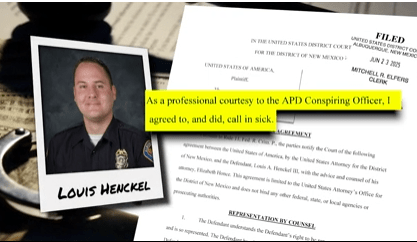A 'Professional Courtesy': When an Officer Went Too Far

A Cop Turned Criminal: The Story of Officer Louis Henckel
In a case that highlights the complexities of law enforcement and corruption, former Albuquerque Police Officer Louis Henckel III admitted to breaking the law to help a fellow officer and his girlfriend. His actions led to a federal crime, revealing a deeper issue within the police department.
The Arrest and the Warning
Henckel was part of the DWI unit in 2017, where he should have been well-versed in the dangers of drunk driving. In February 2019, he pulled over a 23-year-old woman for speeding and found an open bottle of whiskey under her seat. After conducting field sobriety tests, Henckel determined she had a blood alcohol level of 0.13. He then placed her under arrest for driving under the influence.
As he put the handcuffs on, he gave her some words of wisdom. “Life isn’t always easy, but you know what? We make decisions in life – good or bad,” he said. “We make decisions, and then there’s consequences.”
The Consequences of a Bad Decision
The woman later blew a 0.15 on the calibrated breathalyzer, confirming her impairment. Henckel assured her she would be okay, not realizing that his own decision would soon lead to serious consequences.
Court Delays and Dismissals
The case went through several court delays. Initially, the prosecutor tried to proceed with the trial, but the defense requested a continuance due to the absence of Henckel. The judge agreed, postponing the case. Later, another attorney, Thomas J. Clear III, stepped in to represent the accused drunk driver, who was romantically involved with an officer.
Henckel, however, did not appear in court. Instead, he claimed to be sick, which turned out to be a lie. Federal documents reveal that he had agreed to call in sick as a “professional courtesy” to a fellow officer involved in the scheme. He also accepted cash payments, up to $500, to avoid appearing in court.
The Scheme Unfolds
Henckel admitted to receiving money from Ricardo “Rick” Mendez, a paralegal at Clear’s office. Mendez was the first to plead guilty to RICO conspiracy charges in the DWI scheme in January 2025. Henckel’s guilty plea revealed that he knew his absence would allow the case to be dismissed.
The court records show multiple delays and requests for continuances. Eventually, the case was dismissed with prejudice, meaning it could not be refiled. Judge Sandra Engel, who presided over the case, retired in September 2022 after a 16-year career.
The Aftermath
Henckel pleaded guilty to one count of conspiracy in federal court last month. His plea agreement stated he was offered cash, restaurant gift cards, and free legal advice for the scheme. To date, none of the eight officers who’ve taken plea agreements have been sentenced.
This case raises important questions about the integrity of law enforcement and the potential for corruption within the system. It serves as a reminder that even those sworn to uphold the law can fall prey to personal interests and unethical behavior.
Post a Comment for "A 'Professional Courtesy': When an Officer Went Too Far"
Post a Comment